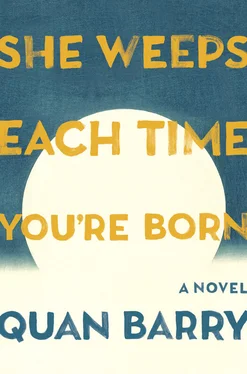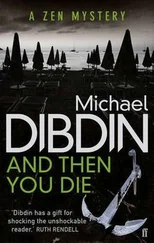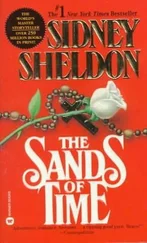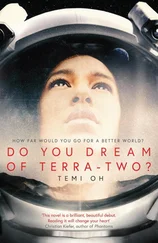Then Rabbit sees her. A small girl is standing in the doorway where the sacristy should be to the right of the altar. The door itself is missing and the opening leads directly outside. The girl is no taller than Linh and completely naked, her impassive face smeared with dirt and maybe worse. The child’s ribs run up and down the sides of her chest like a ladder. There were more than four hundred of us in here, says the girl. She runs a finger through the filth on the altar. Though Catholic, we still celebrated Tet, she says. We were going to begin our feast after mass when the first knock sounded on the door. The last thing I ever ate was banh chung . Do you like banh chung ? Rabbit pictures the small green squares of rice and bean curd wrapped in banana leaves. Very much, Rabbit says. The girl smiles.
Moonlight pours through the empty windows. The dirt and grime blaze silver, a magical dust coating everything. There were fewer than a hundred of us when it started, the girl says. We were giving each other the sign of peace. Even when the others began to arrive and beg us to let them in, people were still greeting the new arrivals with the traditional salutations. Security. Health. Happiness. May you live a hundred years. Gracious wishes for the new spring. Peace be with you. Behind them the night lit up with fires.
The first ones who came were a mother and her three children. The woman was what my father called shell-shocked. It was the little boy who told us they were killing the monks in Hue, lining them up and marching them outside the city. I still remember something he said. “I saw the monks in their orange robes floating peacefully along like suns.” My mother pulled me to her. One of the elders said out of the mouths of babes.
We took refuge in this church for nineteen days. After ten days there was nothing left to eat. The banh chung all gone. The fish and the chickens and the two pigs. More and more people coming. Telling us they were rounding up the civil service workers, doctors, lawyers, teachers, the intellectuals. After the monks they went after the families of the southern soldiers, then anyone they suspected of having ties to the Americans. The girl puts her palms facedown in the grime on the altar. It was the Year of the Monkey, she says. Monkey is a trickster. Firmly the girl presses her filthy hands on her chest. When she pulls them away there are handprints on her skin, fingers splayed like the twinkling of stars. She smiles. Nothing was as it seemed, she says.
The northern soldiers finally found us. They told us to come out. They said they wouldn’t hurt us. They said they’d just send the bad ones among us to reeducation camps and then we would all be brothers and sisters. For nine days we had been praying to the Lady, someone among us always reciting a Hail Mary. When one person would tire, someone else would take up the thread, the words like a constant river. The girl stands drawing on her body with the dirt from the altar. She traces a circle around her belly button, and through the open roof the halo around the moon intensifies.
The soldiers threw a grenade through one of the stained-glass windows, she says. Three people died. She looks at Rabbit. Would you rather die instantly or piece by piece? In the sky the two moons are beginning to merge. Instantly, says Rabbit. The girl considers this.
When they took us outside, my father still had some old C4 on him. We had been using it to cook inside the church. Months before my brother had found a brick of it along a trail. We used it the way the Americans did. We’d shape small balls and light it on fire. The Americans were always heating their rations and leaving the metal tins lying around. We’d use the C4 when we didn’t have any firewood. The flames aren’t the color of regular fire, you know. The girl stops to think. I don’t know how to describe it, she says. Almost a gray-blue.
The girl claps her hands together, sending the dust on her fingers up into a small sparkling cloud. As she breathes her ribs expand and contract like bellows. They shot Ba right away, she says. Afterward they said he was an American stooge. The C4 proved it. Why would an innocent man have the trappings of the capitalist pig on his person? The soldier shot Ba through the neck, but I know he meant to shoot him in the head. His aim was bad because he was weak and hungry. I remember he didn’t look much older than my brother. When he shot Ba, none of us screamed. I don’t know why. Maybe we were too hungry. I just stood watching the life leak out of him.
The girl stops talking. She turns her head as if listening for something. The moon is a solid mass in the sky. The girl looks at Rabbit and backs out the open door of the sacristy, the dust glowing on her body. For a moment all Rabbit can see are handprints and a circle glittering in the doorway. By the time Rabbit gets there, the girl is gone.
In the field behind the church Rabbit can hear the sound of running water. In the distance a creek cuts along the edge of the land. Rabbit begins to walk toward it. She takes her shoes off and walks barefoot. The earth feels spongy beneath her feet. Her soles are stained a dark red, but with what she doesn’t know.
By the creek, Rabbit lets the history wash over her. The occupation of Hue and the surrounding countryside lasts a month. At first the Communists are almost reasonable, thinking they can hold the city. When it becomes evident they can’t, they begin gouging bottomless pits in the earth.
Then Rabbit hears it, the vein throbbing under her feet. What she has come here to find. She thinks back to the Black Tai in Anne-Marie. She can feel the nausea rising in her throat. It’s like nothing she has ever experienced. One could walk right over the spot and think nothing of it. In this tiny hamlet of My Kan, the number of people killed is three times the number of people who lived there, four hundred and twenty-eight dead, and they’re all right here where Rabbit is standing, though the government in Hanoi would deny it.
Rabbit can feel the earth being shoveled over them. Many of them are still alive when it happens, everywhere people drowning in earth. A handful will survive this moment, carrying the taste of dirt in their mouths with them forever. Toward the end two little girls are thrown in hand in hand, one shadowing the other, both their faces still as stone, one with a bullet through the stomach, the other intact, their feet small as the rose before it blossoms. The girls are obviously sisters, perhaps even twins, their eyes starry as the night sky from which they come. The young soldier in charge misbelieves what he sees, maddened by the blood and gore. I’ve already shot that one, he thinks. Look. Her own ghost already walks at her side.
From here it all grows stranger. Everywhere the dolorous ringing of bells. A roomful of jars filled with two-headed babies. Women in red ao dai flying through the air. A man playing a bone flute, the instrument as long as the man is tall, the music like the crying of seabirds, their voices calling Lamb of God, you take away the sins of the world. Then Rabbit sees Her. It is the only time She has ever appeared to Rabbit in any form. The Lady robed in what appears to be a burlap sack, Her thousand arms wilted like the petals of a dead flower. In the sky the moon has separated again, the two moons distinct and some distance apart, the whole sky between them, each one shining in a different direction, light falling on opposing paths. Then the Lady arranges each of Her hands in the fear-not position, five hundred palms blossoming skyward, the others pointing to the earth, Her hands radiating from Her body like the brilliance of a star. Rabbit can feel her mouth filling with dirt. Everything grows dark. The last thing she sees is a small green bird sitting on each of the Lady’s many splendid shoulders.
Читать дальше












